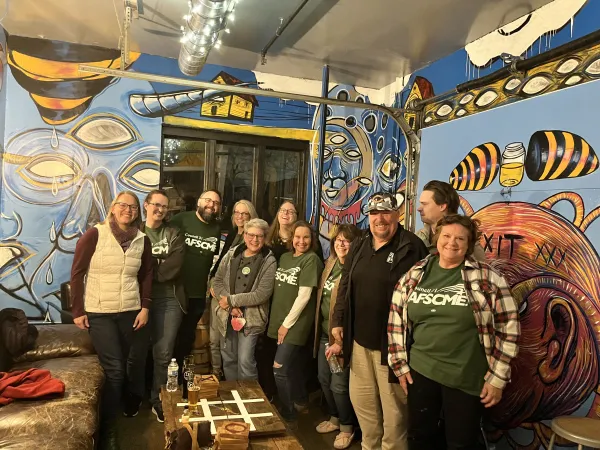St. Charles Public Library workers win first contract

For the 54 AFSCME members at the St. Charles Public Library, their first contract ticks all the boxes—and then some.
Brandon Buckley, an early activist for the union and a young adult librarian of 14 years, said one of his key motivations in helping organize the union—and later, serving on the bargaining committee—was to not sit idly by while the library went down a path he wasn’t comfortable with.
“I grew up in this city, and my family has lived here since the 1800s,” he said. “I feel a connection to this library, and I don’t want to be forced out by people who don’t care about the community. So we had to make a decision: We could either run or we could fight. We chose to fight.”
An important issue was discipline. Workers had no voice, no due process, and no recourse if they were unfairly disciplined. Management unilaterally decided workers were guilty of policy violations without ever properly investigating them.
Records of those alleged violations could sit in an employee’s file for years, and would be used against them if management wanted to get rid of them or deny them a promotion. According to organizer and bargaining committee member Sutton Skowron, a six-year adult services librarian, the discipline policies began to drive more and more workers away.
“People would leave and they wouldn’t be replaced, and the people who still worked here wouldn’t get any more hours,” Skowron said. “You were just expected to do more in the same amount of time for the same amount of pay.”
All this turmoil hurt the community.
“We’re a public organization,” Skowron said. “When we’re allowed to do our jobs, when we have what we need to do our jobs well, the whole community benefits.”
When, after 16 months at the bargaining table, Council 31 Staff Representative and chief negotiator Carla Williams, announced that they had a tentative agreement, the room burst into applause.
“It was just pure joy,” Buckley said. “There was a brightness inside me that hadn’t been there in a long time. I didn’t know how much everything was weighing on me. I just felt lighter. I felt like we got so much in this contract. So many good things were coming our way, it was finally something to look forward to after being so dark for so long.”
Over the life of the four-year contract, they won 17% across-the-board wage increases, with additional wage adjustments for six titles. They also secured a ratification bonus equal to 1% of their annual wages.
Now, all staff at the library—full- and part-time—will receive four weeks of paid vacation, plus two personal holidays that can be used at any time and three personal days. They also made important advancements on paid parental leave; where they previously had none, they now have six weeks.
They also made serious progress on ensuring fairer schedules for all. Before the union, schedules could be changed arbitrarily by managers, leaving parents to scramble for childcare and disrupting the lives of everyone at the library. Now, their union contract ensures that the only time schedules can be changed is if there is a provable operational need.
“You have certain expectations when you go to work at a library. You recognize that you’re not going to get rich doing it, but you at least expect to be treated well,” Buckley said. “We are all very passionate about the job, but the passion was being sucked out of it.”
They won language that makes the disciplinary process fairer and more transparent. Instead of violations remaining in their file forever, now they are automatically expunged after two years, so long as a substantially similar violation does not occur within that time.
The contract was ratified unanimously.
Buckley hopes that other library workers in the area will see the strength they’ve found through their union and what they were able to accomplish in their first contract, and be inspired to organize their workplaces, too.
“When we meet with new employees to do their union orientation, a lot of them come from libraries nearby, and they tell us that they are dealing with a lot of the same things we used to deal with,” Buckley said. “I feel like if every library had a union, they wouldn’t
